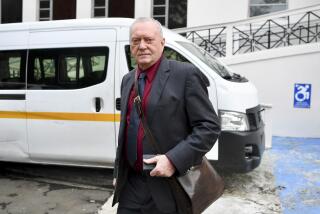The Case Against Hedgecock
- Share via
ROGER HEDGECOCK would probably still be mayor of San Diego--or be in a higher elective office--today had he not become entangled in what he often refers to as the “J. David soap opera.”
In the early 1980s, the La Jolla-based investment firm of J. David & Co. lured investors with promises of 30%-plus annual returns. But when several major investors sought to withdraw their money in early 1984, J. David checks began bouncing and hundreds of other clients panicked, prompting J. David (Jerry) Dominelli, the firm’s founder and namesake, to flee to the Caribbean island of Montserrat.
Eventually, Dominelli was arrested and returned to this country, where he admitted defrauding investors of more than $80 million by using money from new investments to pay dividends on existing accounts--and to finance the fast-lane tastes he shared with Nancy Hoover, his partner and companion. Dominelli is serving a 20-year prison sentence, while Hoover is to be tried next year.
Hedgecock was drawn into the story when he admitted he had invested $45,000 in a J. David account, later used as collateral for an unusual $130,000 “oral agreement” loan from Hoover--though much of the money actually came from J. David--to renovate Hedgecock’s house.
Later, prosecutors found that Hoover and Dominelli had invested more than $360,000 in Tom Shepard & Associates, a fledgling political-consulting agency owned by a former Hedgecock aide. Because most of the firm’s work in early 1983 was on Hedgecock’s mayoral race, prosecutors saw the company as little more than an arm of his campaign, and the “investments” as illegal contributions--far exceeding the city’s $250-per-person campaign-contribution limit.
In September, 1984, Hedgecock, Dominelli, Hoover and Shepard were indicted on charges that they conspired to use Shepard’s firm as a conduit for the illegal donations. Hedgecock also was charged with perjury counts alleging that he intentionally falsified financial-disclosure statements to conceal the plot to circumvent the city’s campaign-contribution limit, as well as the politically embarrassing home loan.
Hedgecock insisted that the money Hoover and Dominelli pumped into Shepard’s firm--used primarily to pay salaries and overhead expenses--was simply a routine business investment. Mistakes on his financial statements, he said, were inadvertent and later corrected.
Prosecutors admitted that their case hinged on circumstantial evidence but argued that Hedgecock had crossed paths with Hoover, Dominelli and Shepard too many times for those incidents to be coincidences.
Hedgecock’s first trial ended in February, 1985, with the jurors deadlocked 11-1 against him. Eight months later, a second jury convicted him.
Afterward, two jurors signed sworn affidavits alleging that a court bailiff had tampered with Hedgecock’s jury during its deliberations by, among other things, helping several jurors to define the crucial legal term of “reasonable doubt.” But in December, 1985, a judge ruled that the bailiff’s actions had not tainted the verdict and sentenced Hedgecock to one year in local custody. The jury-tampering allegations now figure prominently in Hedgecock’s appeal, which is to be taken up by the courts in hearings scheduled for this week. In the appeal, his attorneys argue that his conviction should be reversed for reasons ranging from insufficient evidence to alleged legal errors by a judge and prosecutors.
More to Read
Sign up for Essential California
The most important California stories and recommendations in your inbox every morning.
You may occasionally receive promotional content from the Los Angeles Times.










